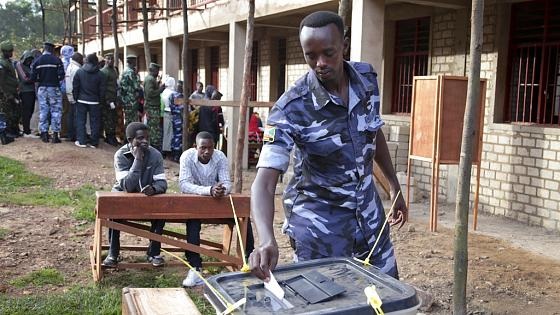
Bujumbura, Burundi | AFP | Burundians voted Wednesday in tense elections to replace their long-ruling president, despite a coronavirus outbreak that the East African nation has largely ignored.
The election comes after five years of turmoil sparked by President Pierre Nkurunziza’s bid for a third term, which unleashed unrest that left at least 1,200 dead and saw 400,000 flee the country.
Burundians stood in long lines outside polling stations to cast their vote in an election taking place without international observers, while social media such as WhatsApp, Facebook and Twitter were cut off.
More than five million registered voters are being asked to choose between Nkurunziza’s hand-picked heir and frontrunner, 52-year-old general Evariste Ndayishimiye, the main opposition competitor Agathon Rwasa and five other candidates.
Elections are also being held for parliament MPs and local councillors who appoint the members of the Senate.
“I am happy to vote for the candidate of my choice today, even if I am afraid of what is happening because social networks were cut,” said primary school teacher Patrice, 30, who voted in northern Ngozi.
“It is important because after 15 years of Nkurunziza, it is time for change. He did good and bad things…. today I want (Rwasa’s) CNL to win because the country needs new blood.”
However ruling party supporter Gertrude, in central Mwaro province, said she would vote for Ndayishimiye “so that he can continue the legacy of our president Pierre Nkurunziza… and beat poverty”.
After a campaign marked by violence and arbitrary arrests — the kind that has persisted in the shadows since the 2015 poll — Rwasa’s party slammed pressure on its electoral observers and alleged fraud.
Obed Ntakiyiruta, a lawmaker and representative of Rwasa’s National Freedom Council (CNL) in southwestern Rumonge province told AFP his party’s electoral agents had been chased out of polling stations.
“In some places we saw ballot boxes being stuffed. Elsewhere people aren’t allowed to vote privately and are under pressure to vote for the ruling party.”
An independent journalist and witnesses confirmed these allegations.
– ‘Divine protection’ –
Burundi, which has a long history of violent ethnic tensions between its Hutu and Tutsi communities and saw several presidents assassinated or ousted in military coups after independence from Belgium in 1962, is listed by the World Bank as one of the world’s three poorest countries.
Since the 2015 election, state forces have been accused by the UN and rights groups of grave rights violations such as torture, disappearances, sexual violence and executions.
The turmoil has only worsened the situation for many, with traditional donors cutting ties with the country, two years of recession followed by paltry growth, and now the potential fallout of the coronavirus pandemic.
Burundi has not imposed any movement restrictions on its 11 million people, as other East African countries have done, and large crowds gathered at campaign rallies.
Ndayishimiye and other officials have insisted that God is protecting Burundi from the virus.
Only 42 cases and one death have been officially recorded.
Doctors accuse the government of minimising the scale of the outbreak and residents of Bujumbura have told AFP of mysterious deaths from respiratory problems and fever.
– Clash of Hutu rebel leaders –
Observers note that while Ndayishimiye is considered the frontrunner, Rwasa drew impressive crowds during his campaign.
“There is a phenomenon of despair, a feeling of ‘anything but the CNDD-FDD’, and Rwasa is riding this wave,” said International Crisis Group (ICG) expert Onesphore Sematumba.
Ndayishimiye is a party veteran who, like Nkurunziza, fought for the ethnic Hutu rebellion during the country’s 1993-2006 civil war with the minority Tutsi-dominated army. The war left some 300,000 dead.
Rwasa, 56, was a leader of the oldest ethnic Hutu rebel movement, the Palipehutu-FNL, one of the two biggest armed opposition groups in the war.
In the eyes of the majority Hutu — 85 percent of the population — Rwasa has as much legitimacy as a presidential candidate as his rival.
“The people won’t let their victory be stolen,” Rwasa warned.
Nkurunziza’s decision to step aside came as a surprise after constitutional changes in 2018 opened the possibility for him to stay in office until 2034.
In January legislators passed a law offering a golden parachute to outgoing presidents, including a luxury villa and a one-off sum equivalent to more than half a million dollars.
Polls close at 1400 GMT, with results expected by next Monday or Tuesday.
 The Independent Uganda: You get the Truth we Pay the Price
The Independent Uganda: You get the Truth we Pay the Price


